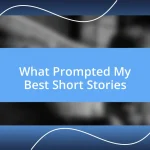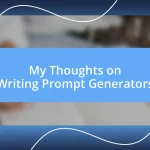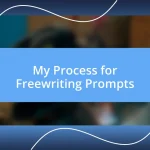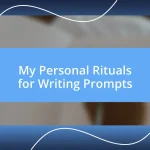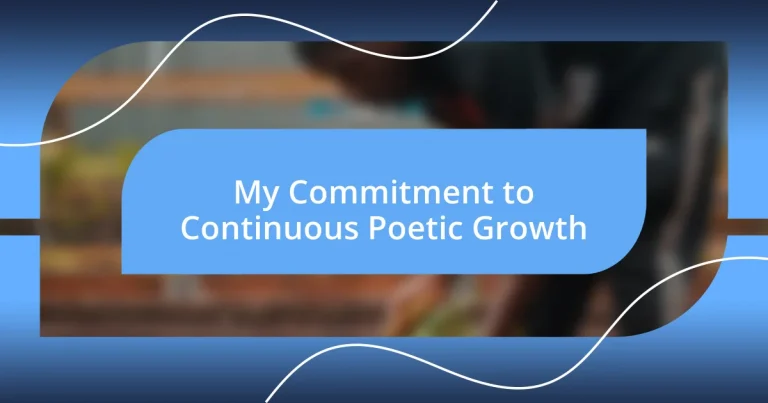Key takeaways:
- Continuous poetic growth emerges from embracing emotions and experiences, highlighting that vulnerability leads to richer expressions and creativity.
- Setting personal poetry goals, engaging in diverse poetic forms, and practicing regular writing exercises enhance creativity and unlock deeper reflections on one’s voice as a poet.
- Receiving feedback from peers and participating in workshops fosters collaborative learning and experimentation, ultimately enriching one’s poetic journey and personal progress.
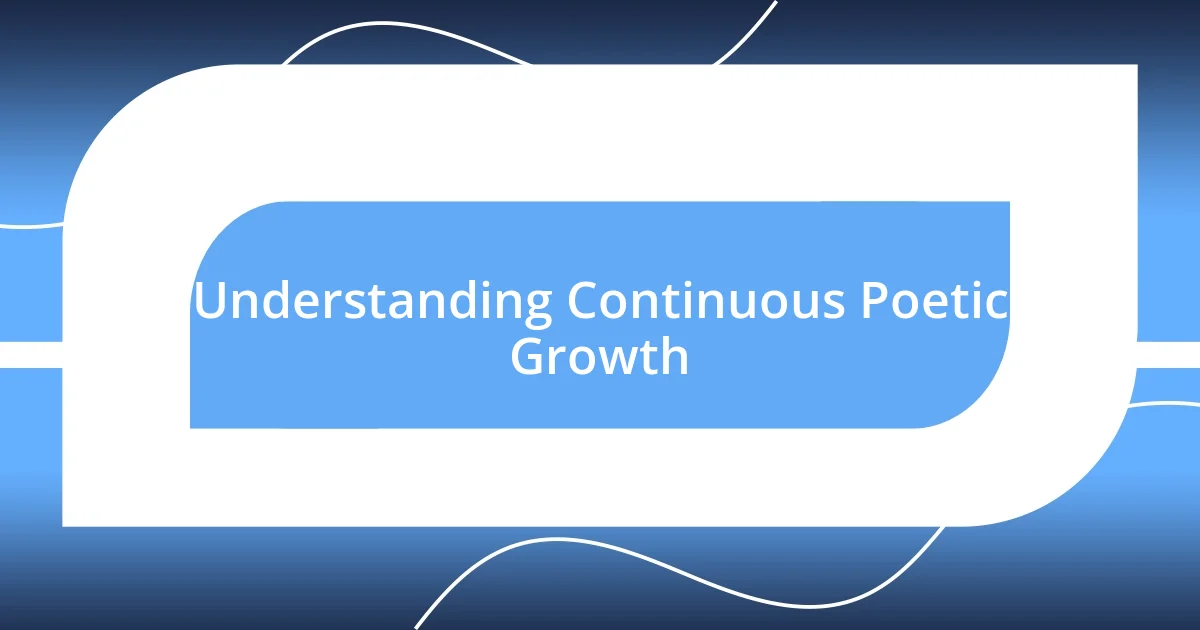
Understanding Continuous Poetic Growth
Continuous poetic growth is an evolving journey, often sparked by the experiences and emotions we encounter daily. I remember a time when a particularly vivid sunset compelled me to scribble verses on a napkin at a café. This spontaneous moment not only fueled my passion for poetry but also highlighted how even fleeting experiences can inspire lasting creativity.
Have you ever felt the urge to write after a deeply emotional experience? For me, it seems that emotion acts as an elixir, breathing life into my words and propelling my growth. Each new poem becomes a stepping stone, revealing hidden layers of my voice and style that I didn’t know existed. I cherish these moments, as they remind me that growth is often born from vulnerability, and embracing that sentiment leads to richer expressions.
Understanding this growth means recognizing that the journey is nonlinear. There are days filled with inspiration and others where the words seem elusive. I’ve learned to approach these dry spells with patience and curiosity, understanding that they too are essential parts of the process. Each experience compounds over time, shaping my identity as a poet, reminding me that continuous growth is less about perfection and more about exploration and discovery.
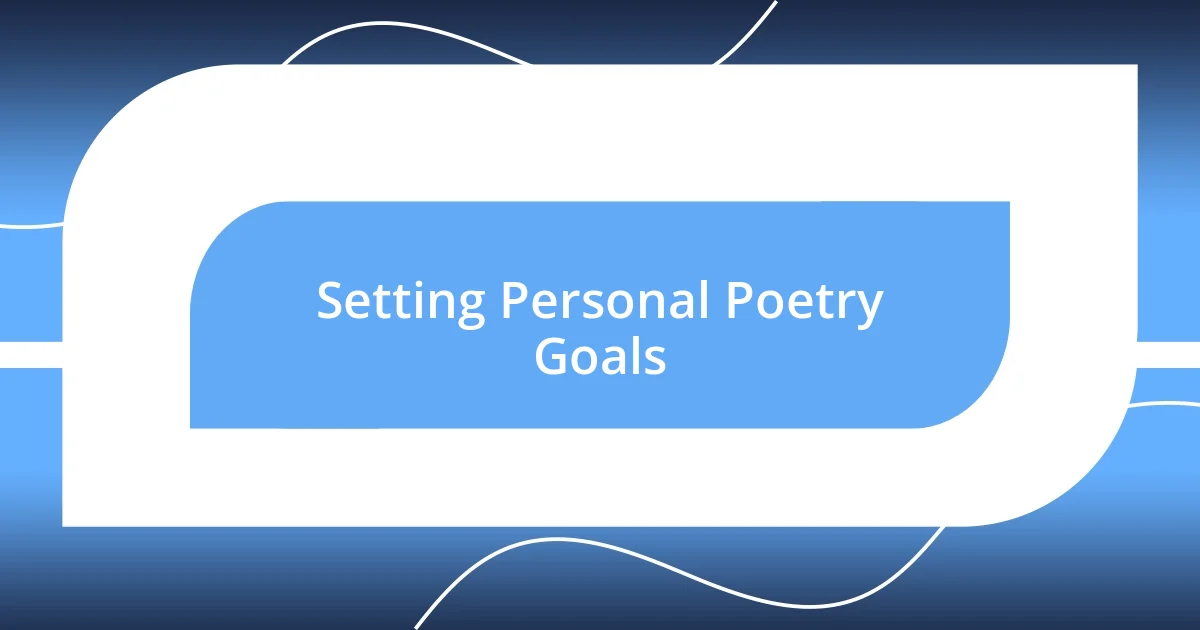
Setting Personal Poetry Goals
Setting personal poetry goals is an essential step in my journey as a poet. When I decided to challenge myself to write a poem every week, I discovered how setting clear intentions can transform my creativity. Sometimes, I find that having a specific theme or emotion to explore not only guides my writing but also deepens my connection with my feelings.
Consider these key points when setting your poetic aspirations:
- Define Your Themes: Choose topics that resonate personally, like love, loss, or nature.
- Establish a Schedule: Commit to writing regularly, whether it’s daily or weekly.
- Vary Your Formats: Experiment with different styles, like haikus, free verse, or sonnets, to keep things fresh.
- Engage with Others: Join a poetry group or workshop to share feedback and gain new perspectives.
- Track Your Progress: Keep a journal of your poems to reflect on your growth and revisit your favorite pieces regularly.
Every time I wrote about a different life experience, I felt myself evolving. For instance, penning a poem about a childhood memory turned out to be a cathartic experience, unearthing emotions I hadn’t touched in years. It was this goal-setting that shifted my perspective; it made me realize that each line I composed was not just a solitary act but part of a larger tapestry of my poetic life.

Exploring Different Poetic Forms
Exploring different poetic forms has been a fascinating aspect of my growth as a poet. Each form offers a unique structure that influences the way I express my thoughts and feelings. For instance, writing a sonnet often challenges me to distill complex emotions into a compact, fourteen-line format. I remember struggling through my first sonnet; the rigid rhyme scheme felt like a puzzle waiting to be solved. Once completed, however, I felt a deep sense of accomplishment that propelled me to try even more forms.
Free verse is another favorite of mine. It allows for a liberating exploration of language without the constraints of rhyme or meter. I often find myself writing in this style when emotions run raw, as it gives me the freedom to pour my thoughts directly onto the page. One late-night session, I jotted down a lengthy free verse piece, capturing the chaos of my thoughts during a period of uncertainty—it became a cleansing experience that taught me that sometimes, less structure can lead to more profound revelations.
In contrast, haikus have given me a way to connect with nature and my surroundings. Their simplicity invites me to pause and observe the world quietly. After a peaceful walk through a park one afternoon, I sat on a bench and crafted a haiku that reflected the vibrant imagery around me. It’s incredible how such a small structure can evoke strong imagery and emotion. By exploring these forms, I’ve come to appreciate how each one shapes my voice, enriching my poetic journey.
| Poetic Form | Characteristics |
|---|---|
| Sonnets | 14 lines, specific rhyme scheme, often explores themes of love or time. |
| Free Verse | No fixed meter or rhyme, allows for natural flow and personal expression. |
| Haikus | Three lines (5-7-5 syllable structure), focuses on nature and moments of beauty. |
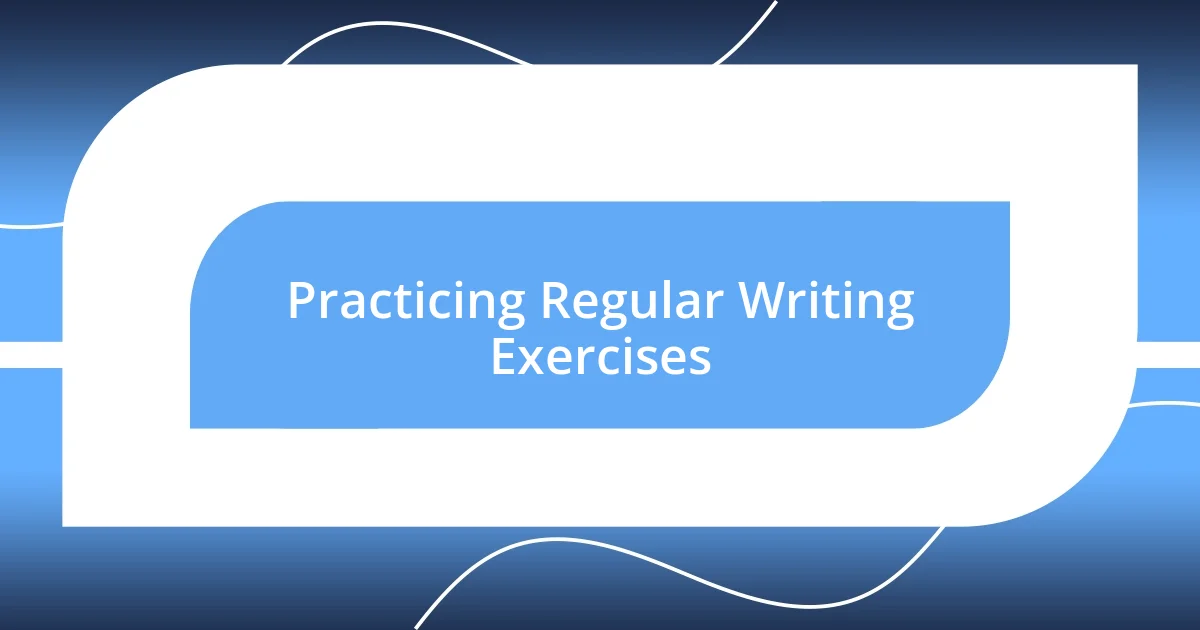
Practicing Regular Writing Exercises
Practicing regular writing exercises has been an absolute game changer for me. There are days when the inspiration flows freely, but other times, it takes a little nudge to get my creativity into gear. I remember setting aside ten minutes each morning to write whatever came to mind. This exercise became a sanctuary for my thoughts, a no-pressure zone where I could let my imagination take the lead.
I often challenge myself with prompts that push my boundaries. For instance, I once tackled the prompt “Write about a door.” At first, I felt stumped. But as I let my pen move, I found myself tapping into memories of the doors of my childhood home—the creaky sounds, the vibrant paint chipping away. It transformed into a nostalgic piece that carried so much emotion, reminding me how certain exercises can unlock unexpected depths within us.
But it’s not just about quantity; it’s also about quality. Reflective writing, where I jot down my thoughts on the writing process itself, has become an insightful practice for me. Questions like, “What did I learn today?” or “How did I feel while writing?” allow me to track my growth. These simple reflections help me realize how much my voice has evolved over time. Have you ever asked yourself what you truly learned from a writing session? You might be surprised to find that there’s a wealth of growth in even the simplest exercises.
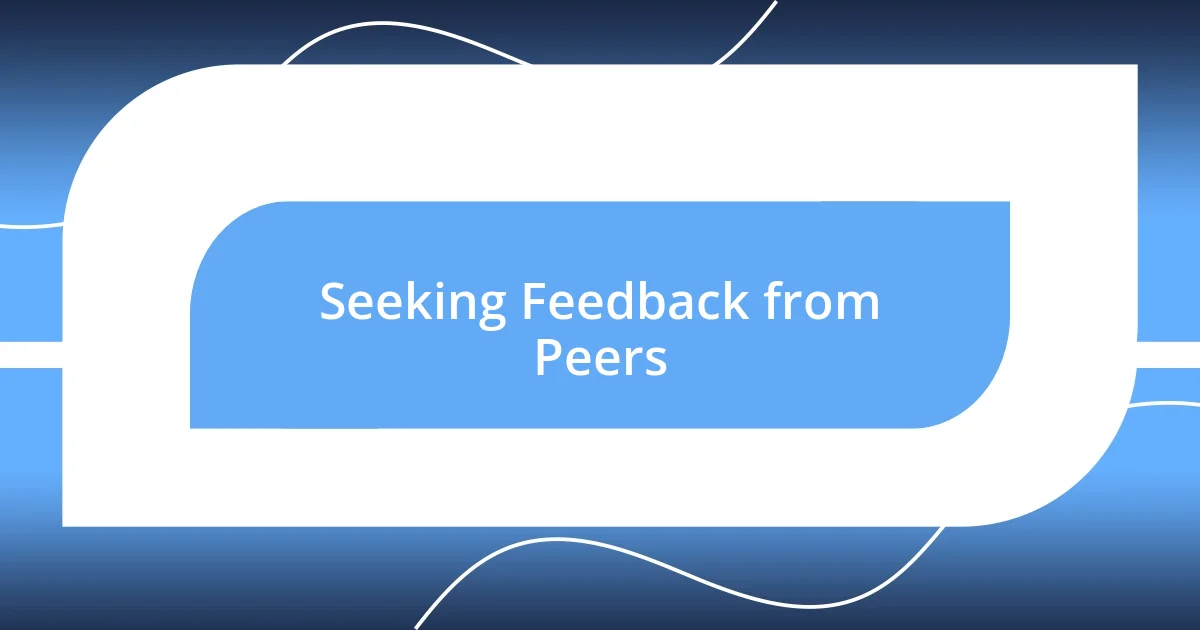
Seeking Feedback from Peers
Receiving feedback from peers is an essential part of my poetic growth. I’ve come to realize that sharing my work in a supportive community often shines a light on aspects I may overlook. For instance, during a writer’s group meeting, I shared a poem that I thought was quite polished, but my peers pointed out a few areas where clarity was lacking. Their insights opened my eyes, and I was able to refine my poem in ways I hadn’t anticipated.
One time, I decided to send a draft of my latest work to a friend whom I deeply respect as a writer. When they returned it filled with notes and suggestions, I felt a mix of apprehension and excitement. Their constructive feedback—for example, suggesting I tighten a few lines—transformed my piece significantly. Have you ever experienced that thrilling moment when a simple tweak makes your writing resonate so much more? It’s a reminder that collaboration can truly elevate our creative efforts.
I’ve learned that not all feedback is created equal. Some responses resonate with me more than others based on the individual’s understanding of poetry. For example, a poet friend once highlighted how rhythm plays a critical role in emotional delivery. Their perspective helped me explore sound in my writing differently. It’s these varied viewpoints that enrich my poetic journey, reminding me that seeking feedback isn’t just about validation—it’s about growth and exploration.
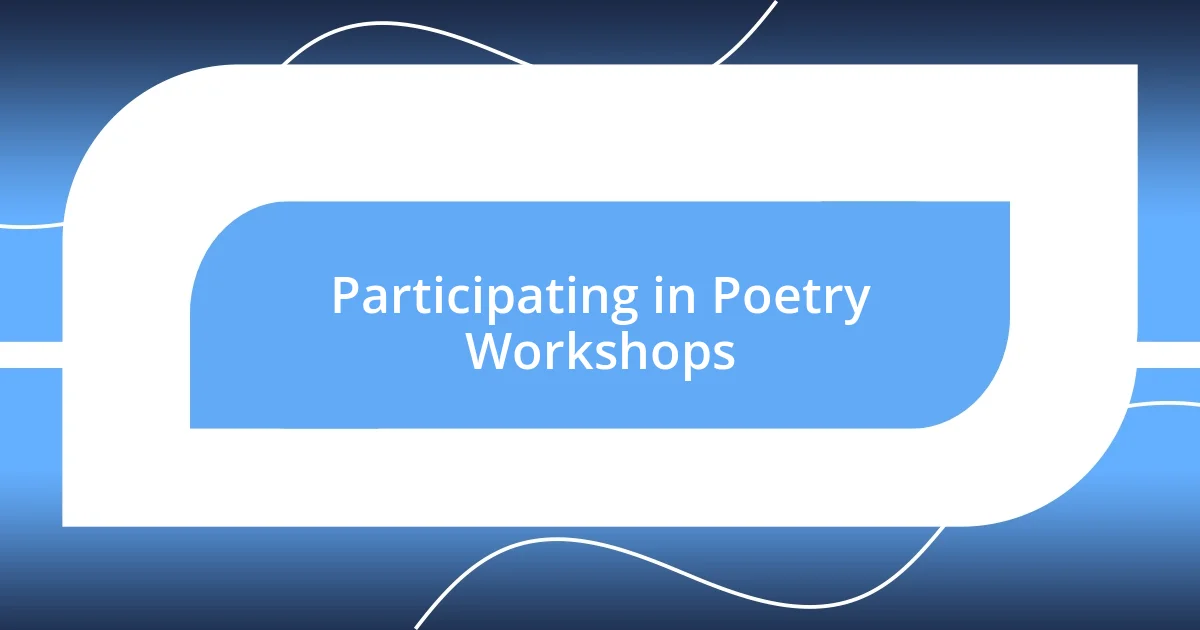
Participating in Poetry Workshops
Participating in poetry workshops has truly been one of my richest sources of inspiration. I remember the first workshop I attended—it felt like stepping into a circle of fireflies, each poet shedding light on different aspects of writing. The energy in the room was infectious, sparking creativity and pushing limits. Through shared experiences, I was able to discover that my struggles were often universal, and that realization gave me both comfort and motivation.
During one session, we focused on spoken word performance. Initially, the thought of reading my work aloud made my heart race. But, after sharing my poem about the beauty of rain, I felt an exhilarating rush of connection, not just with the audience but with my own words. Hearing their reactions and seeing their faces light up as I read made me appreciate the nuances of rhythm and emotion in my writing. Have you ever felt your work come alive in front of an audience? It’s a magic that’s hard to describe and even harder to replicate in solitary writing.
I’ve also found that workshops challenge me to experiment with styles I wouldn’t typically explore. One time, I ventured into a haiku challenge, crafting short, vivid pieces of imagery that seemed simplistic at first. But as I grew this small form into a vivid expression of my thoughts, I realized that the constraints helped clarify my voice. Writing in this format required me to think critically about every word. It’s astonishing how constraints can spark a surge of creativity! Engaging with other poets and participating in these focused challenges allows me to embrace vulnerability and unleash creative potential in thrilling new ways.
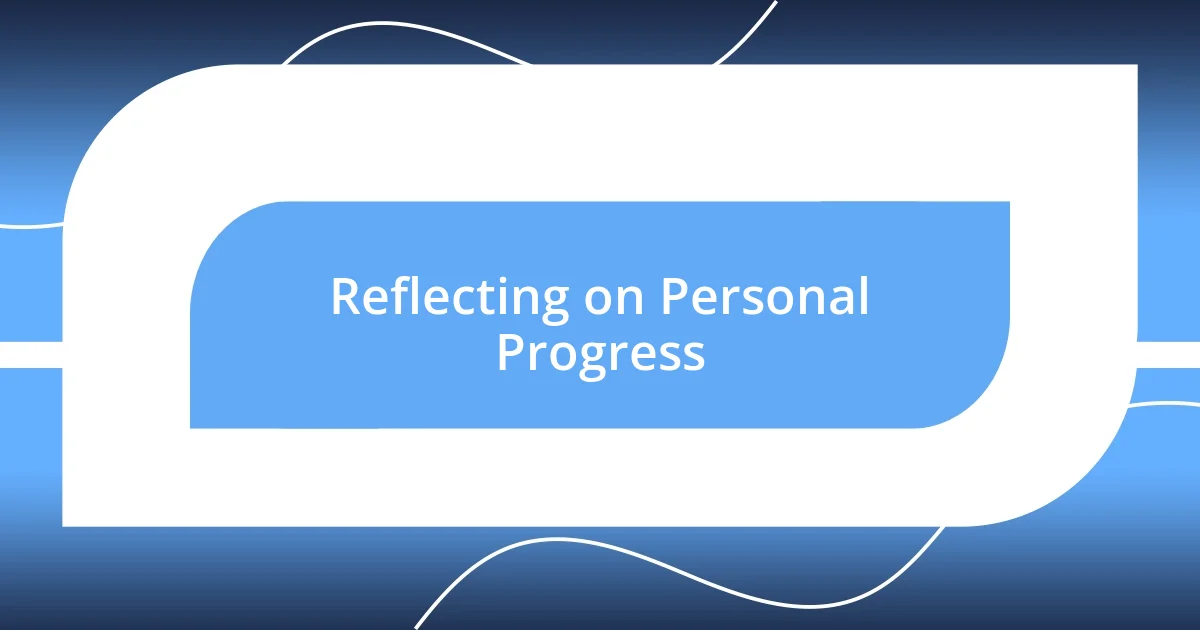
Reflecting on Personal Progress
Reflecting on my personal progress as a poet feels like peeling back layers of an ever-evolving self. I remember the early days when I’d scribble verses in the margins of my notebooks, questioning whether my words truly mattered. Each poem was a small, brave step into the unknown, and looking back now, I realize how far I’ve come. I wonder, do you ever feel that same sense of transformation when you revisit your earlier work? It’s as though I’ve been on a path, and each piece of writing marks a stop along the way.
I often find myself reflecting on the moments that felt pivotal in my growth. One time, after submitting a poem to a local contest, I received feedback that left me both deflated and enlightened. A judge noted that my imagery, while vivid, lacked a certain depth. Instead of feeling defeated, this pushed me to dig deeper into my emotions and experiences. Have you had an experience where what seemed like a setback became the very catalyst for your growth? For me, that feedback turned into fuel, igniting a newfound determination to carve out richer landscapes in my poetry.
Embracing my progress also means celebrating the small victories. I recall a sunny afternoon when I finished a poem I had labored over for weeks, feeling the weight of every word. That moment when I recited it aloud, hearing its rhythm cascade rhythmically through the air—oh, what a joy! It struck me—am I truly my own harshest critic? Recognizing and appreciating these victories has helped me embrace my journey more fully. Each triumph, no matter how small, shapes not just my skills, but my belief in my creative voice.



